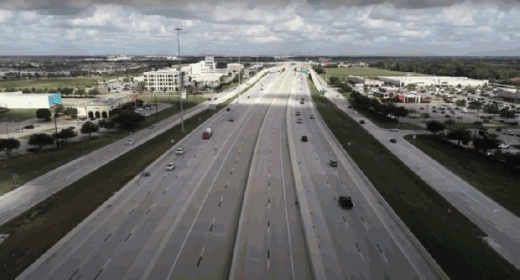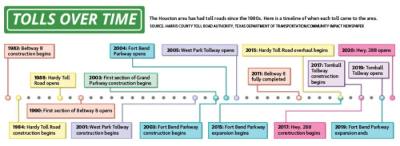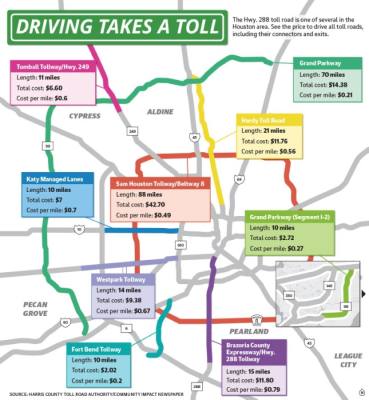“From what was projected and the unknowns of COVID-19, we have been pleasantly surprised by the ridership on the toll road,” Brazoria County Judge Matt Sebesta said.
The toll road has brought in more revenue than expected, despite ridership being down due to COVID-19. However, the increase in revenue does not necessarily mean the road, which cost Brazoria County $80 million, will be paid off early. The county plans on eventually expanding the Brazoria County Expressway 10 miles south of its limit at Croix Road as the population continues to grow, which will incur additional debt, Brazoria County Engineer Matt Hanks said.
“Debt will exist on the entire system much longer than the initial financing obtained for this current project if we are ever going to expand south,” Hanks said in an email.
COVID-19 affects ridership
Since it opened in November, the toll road has brought in $1.56 million in revenue for the county. The revenue from January and February was more than double what was projected for the same two months in 2019, when the toll road was originally slated to open, county officials said.
The 15-mile toll road is broken into two portions, controlled by both Brazoria County and the Texas Department of Transportation. The 5-mile portion that runs through Brazoria County from Croix to Clear Creek is known as the Brazoria County Expressway. Construction ended on the Brazoria County Expressway in the summer, but the toll road could not open until the Harris County portion of the toll road was completed.
The Harris County portion of the Hwy. 288 toll road is controlled by TxDOT and the Blue Ridge Transportation Group and was completed in November. It is over 10 miles long and runs from Clear Creek, which is the Harris-Brazoria county line, to Hwy. 59.
The rate for the Brazoria County portion of the toll road has remained the same since the toll road opened in November, Hanks said. Riding the Brazoria County portion of the tollway costs $1.80.
The Harris County portion, which is longer and has more toll booths, has raised the prices of the tolls since the start of 2021, two months after the road opened.
Northbound and southbound toll booths used to charge $0.45 or $0.50 a booth; as of April 1, the cost is $0.80 a booth. The connectors on to Beltway 8 used to cost $0.80 a connector; now, they cost $1.30 a booth. The connectors to Loop 610 used to charge $0.50 a booth; now they cost $0.80 a booth. To ride the entire Brazoria and Harris County portions of the toll road one way at peak hours, drivers would pay $9.50.
The county did a traffic and revenue study for the road in 2019, and ridership has been higher than projected. Even with the pandemic, ridership was high.
Hanks believes the toll road has been so successful due to the ease of ridership onto the Beltway and into the Texas Medical Center, he said. The design of the roadway makes it comfortable for residents to get onto the tollway, which also contributes to the road’s success, he said.
General traffic did dip during the pandemic. The lowest dip in traffic ridership due to COVID-19 was during the original two-week stay-at-home order, said Allie Isbell, transportation manager with the Houston-Galveston Area Council.
During the fall, ridership increased for rural counties but remained lower than usual for Harris County, Isbell said.
“Harris County, with fewer people coming into the urban core, central business district to work, that number remained lower,” Isbell said.
With less driving to the office, people are still taking shorter trips, she said.
“I think it’ll be a balance,” Isbell said. “They might be going back and forth to the grocery store during lunch when before it might have been on the way home. They might be going to the park for a walk during lunch. We are seeing more of those shorter trips.”
Paying for toll roads
Brazoria County has until 2050 to pay off the toll road. However, the toll road could be under construction again in the future for routine upkeep or a possible extension. Either option would add to the debt and the length of time to pay off the debt, Hanks said.
The Brazoria County Expressway was environmentally cleared in 2008, with the project set to run from the Harris-Brazoria county line at Clear Creek to its eventual intersection with the Grand Parkway. Construction on this segment of the Grand Parkway, Segment B, has not yet begun, but once it is built, it will run to where CR 60 in Brazoria County is today.
Were the fully approved Brazoria County Expressway constructed, it would be 15 miles long—three times longer than the existing Brazoria County portion of the roadway. This portion of the road is not financed.
“Debt may be required at some point in the future for improvements to the system and replacement of aging infrastructure,” Hanks said. “Therefore, in theory, a system such as this can be ‘paid off,’ but it takes a considerable amount of time and a number of factors to align before this can be obtained.”
Progress on the Grand Parkway segments has been slow. Despite this, Sebesta thinks there is a good chance the Segment B portion of the road will move forward, as the population wants it.
“For the Grand Parkway, there is a push to get a portion of Segment B done,” he said. “At some point, it will be completed, and that will likely bring some additional growth and some need to bring the managed lanes to that point.”
State Rep. Ed Thompson, R-Pearland, has sponsored House Bill 3968 in the Texas Legislature, which would allow residents to vote for whether they want a toll road in the area. The state has stopped TxDOT from presenting new toll roads; this would be an antidote to that, Thompson said.
“There’s a lot of communities out there that might be accepting of a toll road, but it’s sort of stuck in the process of TxDOT saying, ‘It’s a non-toll environment,’” he said.
Thompson is not sure the bill will be passed this legislative session, as it has not received a hearing as of early May. He is hoping it starts a conversation on the state level.
“We may not get anything done on this bill in this legislative session, but I think it is important we continue to have conversations and talk about this as our state continues to grow,” Thompson said.
The growth in Iowa Colony, Manvel and Rosharon as well as the growth on the horizon are good reasons to extend Hwy. 288, Thompson said.
“We’re looking at a population of 50 million people by 2050, and there are going to be areas of Texas that are going to grow that we have never heard of before,” he said.







